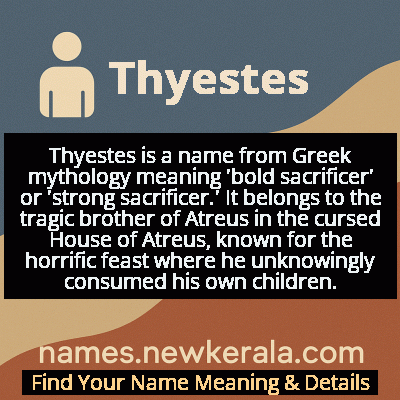Thyestes Name Meaning & Details
Origin, Popularity, Numerology Analysis & Name Meaning of Thyestes
Discover the origin, meaning, and cultural significance of the name THYESTES. Delve into its historical roots and explore the lasting impact it has had on communities and traditions.
Name
Thyestes
Gender
Male
Origin
Greek
Lucky Number
4
Meaning of the Name - Thyestes
Thyestes is a name from Greek mythology meaning 'bold sacrificer' or 'strong sacrificer.' It belongs to the tragic brother of Atreus in the cursed House of Atreus, known for the horrific feast where he unknowingly consumed his own children.
Thyestes - Complete Numerology Analysis
Your Numerology Number
Based on Pythagorean Numerology System
Ruling Planet
Uranus (Rahu)
Positive Nature
Strong sense of order, loyal, practical, and disciplined.
Negative Traits
Stubborn, overly serious, rigid, and prone to feeling restricted.
Lucky Colours
Blue, gray.
Lucky Days
Saturday.
Lucky Stones
Blue sapphire.
Harmony Numbers
1, 7, 8.
Best Suited Professions
Managers, engineers, accountants, organizers.
What People Like About You
Dependability, discipline, practicality.
Famous People Named Thyestes
Thyestes of Greek Myth
Mythological Figure
Central figure in the cursed House of Atreus, known for his feud with his brother Atreus over the throne of Mycenae
Thyestes (Literary Character)
Tragic Hero
Protagonist in lost tragedies by Sophocles and Euripides, and later in Seneca's Roman tragedy 'Thyestes'
Thyestes (Operatic Character)
Opera Character
Featured in various Baroque operas including works by Porpora and Jommelli based on the mythological story
Name Variations & International Equivalents
Click on blue names to explore their detailed meanings. Gray names with will be available soon.
Cultural & Historical Significance
Throughout classical antiquity, the story of Thyestes served as a moral exemplar warning against the dangers of ambition, familial discord, and the inescapable nature of fate. The mythological narrative influenced countless later writers, from Roman tragedians like Seneca to Renaissance dramatists and modern psychoanalytic interpretations of family dynamics. The name continues to resonate in literary and psychological discussions about inherited trauma, the corruption of power, and the dark aspects of human nature that can emerge within family systems.
Extended Personality Analysis
Individuals named Thyestes are often perceived as complex, intense personalities marked by a combination of ambition and tragic flaws. They tend to possess strong willpower and determination, but these qualities are frequently tempered by a tendency toward impulsiveness and a capacity for deep-seated resentment. The mythological association suggests someone who may struggle with familial relationships and inheritance issues, potentially carrying burdens from their ancestry or past.
There's often an undercurrent of passion and intensity in their character, coupled with a fatalistic outlook that can either drive them to great achievements or lead to self-destructive behavior. The name implies a person who experiences extreme emotional highs and lows, with a capacity for both great love and profound vengeance. They may be seen as charismatic yet troubled figures, often finding themselves in dramatic circumstances that test their moral boundaries and resilience. This complex psychological profile reflects the mythological character's journey through betrayal, loss, and the search for redemption or revenge.
Modern Usage & Popularity
In contemporary times, Thyestes remains an exceptionally rare given name, primarily used in academic, literary, or classical circles rather than mainstream naming practices. Its usage is almost exclusively confined to families with strong classical education backgrounds or those specifically seeking mythological names with dramatic weight. The name's association with one of Greek mythology's most horrific stories makes it a challenging choice for modern parents, though it occasionally appears in creative works or as a middle name for those wishing to make a strong classical statement. There are no recorded instances of Thyestes appearing in modern baby name popularity charts, and its usage remains largely symbolic or academic rather than practical.
Symbolic & Spiritual Meanings
Thyestes symbolizes the destructive power of familial curses and the inescapable nature of fate in Greek tragedy. The name represents the cyclical nature of violence and revenge, serving as a metaphor for how past transgressions can haunt future generations. It embodies themes of betrayal, cannibalism (both literal and metaphorical), and the corruption of sacred family bonds. Symbolically, Thyestes stands for the ultimate violation of natural order—where familial love turns to hatred, and nourishment becomes poison. The name also carries connotations of ambition overthrown by tragic flaws, and the psychological weight of ancestral sins that continue to shape present actions and relationships.

